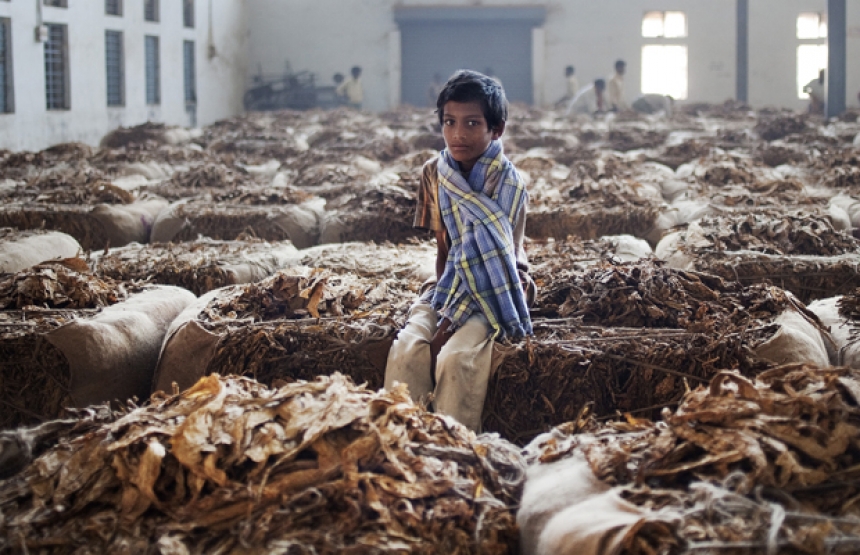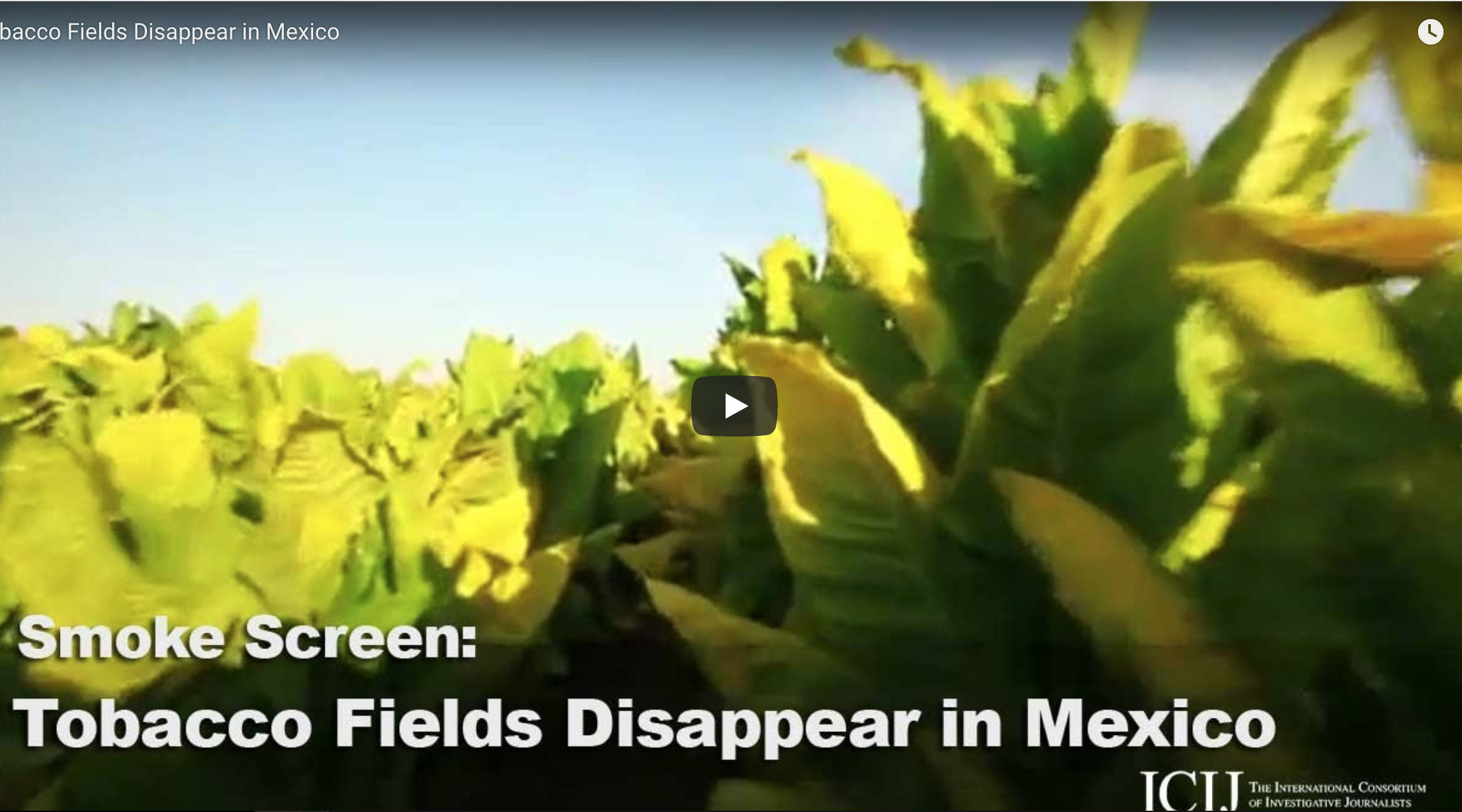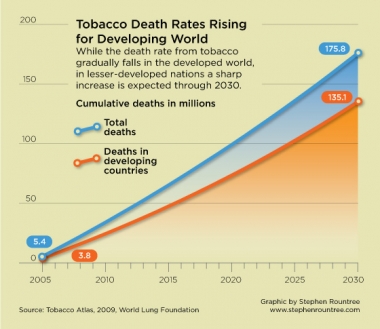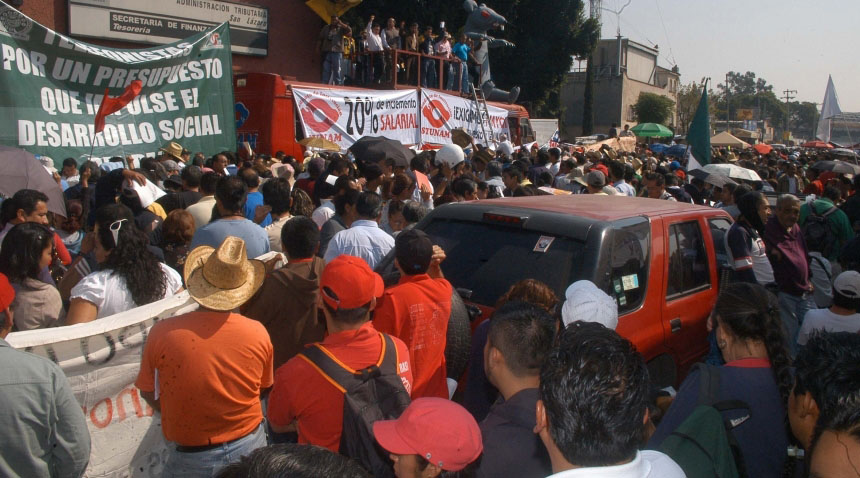Close to the Ganges River, which flows through India’s holy city of Varanasi in the northern state of Uttar Pradesh, Janaki Devi is a textbook example of poor, working women who turn the wheels of one of India's most important industries.
Every morning she bathes in the river Hindus consider their holiest landmark. This is as restful as it gets for Devi; it’s just before she starts a grueling, eight-hour routine of filling reddish brown tendu leaves with 2 grams of tobacco flakes, then tying them with thread. Completing a bidi every 25 seconds, each day she must roll at least 1,000. For this, she earns $1 a day.
"I work without a break. I need the money to sustain my family,” says Devi, eyes focused on a large cane tray on her lap where she works. She earns $25 a month. That wage is low, even in India, where more than half of the population lives on an average of less than $2 a day.
Devi is among the roughly six million women who roll bidis in India; their arduous profession is the second-largest labor-intensive occupation in the world’s second-largest tobacco market – a country where a quarter of the population is said to be addicted to various forms of tobacco. Women constitute almost 75 percent of the total bidi workforce, which yields between 750 billion to 1.2 trillion sticks every year.
The bidi, which resembles a small marijuana cigarette, poses a big health risk for smokers and rollers. It contains more nicotine and tar than conventional cigarettes.
But the industry rides on a wave of significant political clout fueled by revenue of up to $20 billion annually, according to conservative estimates. In fact, in the global struggle to check tobacco consumption – the world’s leading preventable cause of death – India has been a losing proposition for public health advocates because of the bidi industry’s political influence and marketing muscle.
A probe by the International Consortium of Investigative Journalists found the bidi industry insulated by its strong political connections against the best intentions of health activists and critics in the Indian government who want tougher regulations and higher taxes on the industry. Even more troubling: Executives of some leading bidi manufacturers themselves hold government offices.
 As a result, public health campaigns have yet to gain traction in India; taxes on bidi products are low and regulations lax.
As a result, public health campaigns have yet to gain traction in India; taxes on bidi products are low and regulations lax.
“Bidi is the cheapest form of intoxication and hence, no one wants to target the growers in India,” said Amit Sarkar, a veteran tobacco analyst. “The bidi market will continue to grow as long as the lobbyists are able to fill the coffers of politicians.”
“Routinely, bidi owners have evaded regulation on the basis of purported difficulty in enforcing laws in a cottage industry. The sector has been highly effective at supplying a highly addictive product at an affordable price,” Sarkar said.
Bidi makers have ignored evidence that their product causes all manner of illness, from asthma to tuberculosis. Instead, manufacturers argue that they perform a national service by employing large numbers of Indian women.
A smoker’s paradise
“Ours is a legitimate business that caters for the poor in the country,” says Shravan Patel, former member of parliament of the Congress Party. He owns the Tiger Brand bidi company in India’s central Madhya Pradesh state, with annual revenues of about $90 million. This one state contributes nearly 25 percent of India’s total tendu leaf output.
There are some 100 million bidi smokers in India, a number that cradles an even more troubling statistic: About 12 percent of teens in India, aged 13 to 15, have tried tobacco at least once.
Bidi consumption trumps conventional cigarette smoking by as much as eight to one. Cost is a key reason – a bundle of 25 bidis costs as little as 10 cents, compared to roughly $1.50 for a similar pack of branded cigarettes.
But bidi makers recognize threats on the horizon.
Today they’re pushing back not just against Indian tobacco control and health advocates, but also multinational makers of conventional cigarettes who are gaining a toe-hold among the young and the middle class. Since bidis are seen as the smokes of the poor, conventional cigarettes are becoming more fashionable among upwardly mobile Indians who want a classier image, said Shoba John, who spearheads anti-tobacco advocacy in India for the global Framework Alliance on Tobacco Control.
“Bidi makers are using old tobacco industry tactics to defend their market, things like hiring lawyers to lobby politicians,” John said.
Over the past decade, India’s bidi makers have also exported more of their smokes to Europe and the United States. John said marketing abroad has spruced up the bidi image to appeal to young hipsters. Using the Internet, bidi exporters tout them as natural, less-dangerous alternatives to traditional cigarettes.
In 2009, according to the Centers for Disease Control, almost 3 percent of high-school boys in the United States had tried bidis. The trend is enough to lead one major bidi maker to gloat on its website that its products are “increasingly popular in the United States and Europe” – markets that have become more important for the company, which makes 20 billion bidis a year and employs 150,000 people in India.
“In the U.S. and the U.K. you can find flavored bidis aimed at the young. You can’t find flavored bidi here in India.” John said.
Yet by banking on its political connections and the long-held image as a boon for India’s economy and as a poor man’s product, the bidi industry has maintained special status in society. Even the government gives it some of the best tax breaks in the world.

“If the current tax structure continues, bidi will be a $50 billion industry in a decade’s time,” said Deepak Talwar, one of India’s foremost lobbyists for conventional cigarette makers. He’s also been a confidant to the nation’s biggest bidi manufacturer, Praful Patel. In an interview with ICIJ, Talwar described bidis as a permanent fixture in India life and politics.
Encouraged by those low taxes and backed by influencial polticial players like Talwar, India’s bidi business rolls on with scant regard for how it affects public health.
India is home to some 300 major bidi companies – and thousands of smaller ones – and half of their employees ultimately die of tuberculosis or asthma, according to Indian health activists.
Tuberculosis and bronchial asthma among bidi rollers – mainly due to the dust they inhale – is higher than that among India’s general population, according to research by the Mumbai-based Factory Advisory Services and Labour Institute, which is part of India’s Labour Ministry.
Each year close to 1 million deaths related to tobacco disease are recorded in India; about 600,000 of those deaths are tied to bidis. More Indians have been found to be dying of bidi smoking than from all other forms of tobacco combined, according to studies by the World Health Organization and the Voluntary Health Association of India.
Bidis are distributed primarily by an estimated sales force of 10 million mom-and-pop stores where brands play off popular names and pictures of Hindu gods, such as Ganesh (the Elephant God) and Karim (meaning kindhearted) in the Islamic faith.
The bidi king

Today bidi is king in India because the country’s bidi king is Praful Patel. His family runs the $5 billion CeeJay Group, the largest bidi maker in India’s western Maharashtra state. The company also has interest in pharmaceuticals and financial services, among other businesses, and employs at least 60,000 people. Patel also is India’s heavy-industries minister and owns a reputation for wielding great political clout.
As one of the richest cabinet ministers in the government, Patel is known as a charismatic and dapper politician. News accounts have chronicled his propensity to socialize with celebrities and favor conversation about cricket, Bollywood and aviation. Patel declined to talk to ICIJ about the bidi business.
Despite his political and financial power, Patel has been investigated for fraud and was blamed in May by the Comptroller and Auditor General of India, the country’s budget watchdog, for driving Air India into the red when he was the nation’s civil aviation minister.
Patel is a member of the Nationalist Congress Party, whose top man, Sharad Pawar, is also India’s agriculture minister. Last year, published reports detailed allegations that the two were involved in suspicious financial dealings in the Indian Premier League, the world’s most expensive cricket league.
One fellow politician predicted that Patel will survive, with his political juice intact.
“He is powerful and legislators in his home state Maharashtra owe blind allegiance to him,” said a federal legislator who is close to Patel but insisted on anonymity because he fears political reprisal. “He is their mentor, benefactor and maker – all rolled into one.
Patel’s proximity to Deepak Talwar, the tobacco lobbyist who once represented British American Tobacco and Japan Tobacco International, also has helped him become a big player in the duty-free space, with the lucrative Delhi Duty Free stores.
“I know Patel well and have had legitimate businesses with him,” Talwar told ICIJ.
Phantom giants
Despite the size of Patel’s CeeJay Group, it is listed with the government as a small and medium enterprise which affords it federal subsidies.

The company offers few details about its operations, but industry analysts say CeeJay Group employs an estimated 50,000 women across eight states.
On paper, for example, the Maharashtra state government has only 19 registered bidi companies but industry analysts estimate the unofficial number is more than 60 such companies, rolling over 5 million bidis every day.
On a pack that costs $4.45, manufacturers pay less than 2 cents in sales and excise taxes, said bidi roller Balbhadra Nayak, who works for a company based in Sambalpur, in east India.
In an interview, Raghu Mohanty, Orissa state’s industry minister, said it is difficult to control bidi manufacturers who routinely show less production to avoid taxes, labor costs or provide benefits
“It is a Herculean task, the state alone does not have the power to do it,” Mohanty said.
Bringing about change in how bidis are taxed won’t be as easy as evading taxes – a widespread practice in India. Out of India's population of more than 1 billion, fewer than 35 million pay taxes – 3 percent of the population.
For bidi makers, low taxes are no accident.
“The Indian bidi industry enjoys the protection offered by the government that itself stipulates a pittance of taxes for companies producing less than five million bidis a year,” says Udayan Lall of the New Delhi-based Tobacco Institute of India. Cigarette taxes currently account for less than 40 percent of the retail price of a package, among the lowest in the entire Asia Pacific region and far below the WHO's recommended levels of 65 to 80 percent.
The cigarette/bidi coalition
Taxes also create a common interest for traditional commercial rivals.
Every time the Indian Parliament debated increased taxes on bidis, politicians vociferously protested in large numbers, calling taxes a campaign against the poor. Indian Parliament records show the government addresses the issue at least once a year, usually around the end of February, when the federal budget nears adoption and the lobbying from special interests begins.
This is when bidi companies team with cigarette manufacturers, such as the faction led by Kolkata-based Indian Tobacco Company, to lobby against tobacco regulations.
Disclosures made by the Ministry of Health and Family Welfare, under India’s young law mandating access to federal information, recently revealed how Health Minister Nabi Azad delayed enforcement of rules requiring stark pictorial warnings on tobacco packaging similar to those in aggressively anti-tobacco countries like Uruguay. Today most bidi and cigarette packages simply say “SMOKING KILLS.”
Global health studies have shown graphic warnings effective in reducing smoking. But getting a tougher message across may be difficult. Lawmakers and ministers have lobbied against the new notifications on both cigarettes and bidis.
The access-to-information law required the first set of graphical warnings to be replaced by stronger messages by June 1, 2010. Notification for that change went out on March 5 of that year.
“But Azad intervened and wanted this notification to be kept in abeyance. When the tobacco control wing in the ministry warned of a backlash, the deadline for new warnings was pushed to December, 2011 instead of keeping the notification in abeyance,” said a note from the RTI, obtained by Delhi-based social activist Subhash Chandra Agrawal.
“Some delays have happened but the signs will soon come on both cigarette and bidi packets,” Azad said in an interview with ICIJ. He declined to suggest a deadline for the change.
No health initiatives
So far the Indian government refuses to take a clear stand on bidi and public health. In October 2010, the health minister released the Global Adult Tobacco Survey, which showed how – despite a ban on public smoking – about a third of Indians were exposed to second-hand smoke outside the home. The bulk of the smoke came from bidis, the study concluded.
This evidence is not enough to convince bidi makers of their product’s great cost to Indian society.

Praful Patel –the bidi boss in Maharashtra state – once promoted bidi as the best employment option for women.
"If they didn't do this, what other job could these women do? It's just like knitting. It’s a fine-tuned, nice job,” Patel told The Wall Street Journal in 1999.
India’s labor activists accuse bidi manufacturers of deliberately keeping wages low and ignoring exploitation. Nearly 50 percent of the mostly female workforce toils inside homes, where it is difficult to enforce labor standards and prevent child labor.
“Their situation remains the same,” R. K. Ratnakar, general-secretary of the All India Bidi, Cigar and Tobacco Workers Federation, told ICIJ. “The workers are actually a helpless lot because of their pathetic salary structure. They are in no position to argue.”
Yet there is supposed to be protection of worker health. The Bidi Workers’ Welfare Fund Act provides for the levy and collection of taxes through a duty on manufactured bidis that pays for worker welfare programs.
“Taxation is the single most important measure that countries can take in reducing tobacco consumption. What governments fail to understand is that the cost of caring for people, lost productivity and impact on children through secondhand smoke is nearly four times higher than the tax collected by the government from tobacco products,” said Harley Stanton, president of Asia Pacific Conference on Tobacco or Health.
Numbers are one thing. The human impact of the bidi industry is another.
On a recent evening, darkness fell on the banks of the Ganges as hundreds of people let loose their floating floral tributes – lightweight earthen lamps and flowers packed in cones shaped from lotus leaves.
Sunita, a 53-year-old bidi worker, was among the throng. After the ceremony she scampered from the river’s edge with a small kerosene lamp – back to her work shed.
“I do not have the luxury to take long breaks. There are hungry mouths to feed and this is the only living I know. It is the grind that we are accustomed to, what else can I do?” she says, coughing loudly as she returned to her bidi station, with her three three young children looking on at her work. Sunita was not quite done with her eight-hour shift for a bidi contractor.



